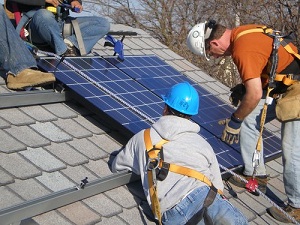Cuomo signs trio of solar bills into law
 New York Gov. Andrew Cuomo (D) signed into law three bills as part of the NY-Sun initiative. The bills provide tax credits for solar equipment, tax abatements and sales tax exemptions. The bills are designed to make solar energy more affordable for homeowners and businesses and to support job creation in the solar sector.
New York Gov. Andrew Cuomo (D) signed into law three bills as part of the NY-Sun initiative. The bills provide tax credits for solar equipment, tax abatements and sales tax exemptions. The bills are designed to make solar energy more affordable for homeowners and businesses and to support job creation in the solar sector.
Under the new laws, New York residents now have access to statewide tax credits for homeowners who lease or have a solar system under a power purchase agreement (PPA). Commercial solar systems are exempt from sales tax and allows municipalities and cities to exclude the costs from local sales tax. And the New York City property tax abatement law extends the tax abatement period in the city to 2014, according to the New York State Energy Research and Development Authority (NYSERDA).
The homeowner law allowing tax credits for leased and PPA based systems is allowed on agreements that span at least 10 years, according to NYSERDA. The credits last for up to 14 years and cap out at $5,000 for all years. Leases and PPAs have led to explosive growth in residential solar in states like California and Colorado and they’re poised to do the same in New York. “Major PPA players are here and looking for as many signals as possible to expand,” said R. Sail Van Nostrand Owner of Energy by Choice, LTD. and Vice President of the New York Solar Energy Industries Association. Among others already operating in the state are Solar City, SunRun and SunPower, he said.
“The tax credits on the leasing will allow leasing to deploy even faster, they will benefit from the tax credit which they hadn’t before,” said Nostrand. It could also serve as kind of multiplier for residential solar. “The more solar people see in their daily lives, the more interested they will be to go to solar,” he said.
“I think these bills are additional steps in the right direction,” Nostrand said. But he said more action is needed. “We’re looking for a longer single solution.”
For instance, some utilities, like Central Hudson Gas & Electric are closing in on their net-metering requirements. And while the utility is still accepting applications, the state’s public service commission is still working out how to expand net-metering. Others aren’t waiting. “Some are voluntarily doing it, the Long Island Power Authority is holding a hearing to expand from 53 megawatts to 150 megawatts for net-metering,” Nostrand said. “I think you’re starting to see some momentum in allowing net-metering go where it was really intended to go.”
The legislation was supported by both Democrats and Republicans, according to Nostrand. “Both sides of the isle understand the value of renewable energy,” he said.



